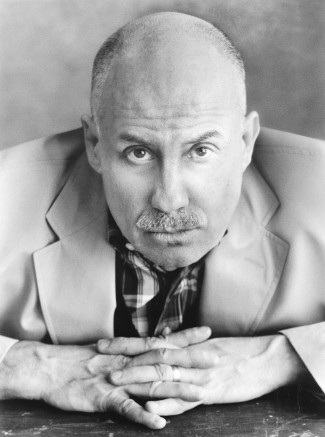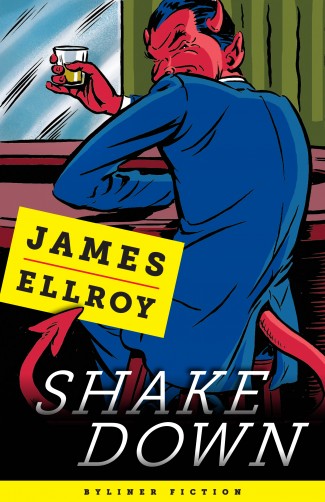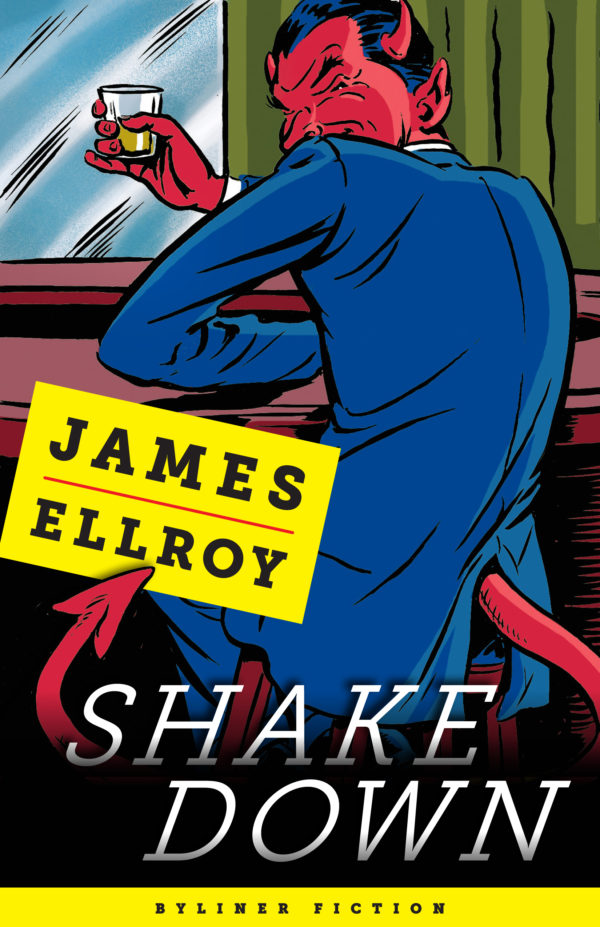INTERVIEW: James Ellroy on ‘Shakedown,’ scandal magazines, his next four novels

James Ellroy, author of such historical fiction classics as L.A. Confidential, American Tabloid and the more recent Blood’s a Rover, is known for his convoluted, aggressively paced novels, some hovering near the 1,000-page mark. For a novelist with a resume of voluminous books, it comes as a bit of a surprise that his latest work is a novella running less than 100 pages. Even more surprising is the new piece is an e-novella, the product of a man who admits to never owning a computer in his life.
Shakedown, recently released in electronic format from Byliner, returns Ellroy to his alliterative language of the scandal magazines from his youth in Los Angeles. This time, he chronicles the purgatorial struggle of Fred Otash, a “rogue cop, private eye, shakedown artist” who Ellroy knew as an acquaintance in real life. The piece couples “history” with “fiction” into a nebulous middle ground governed by Ellroy himself, or “Dog” to his friends.
Recently, Hollywood Soapbox talked with Ellroy about Shakedown, his upcoming series of novels, his origins as a writer and his new home in Los Angeles. Here is a selection from that conversation. Questions and answers have been edited.
(Ring)
Ellroy.
Hi, Mr. Ellroy. It’s John Soltes.
Hey, I know you.
Sure, it’s been a couple conversations now we’ve had.
Yep, I remember I met you on Eighth Avenue once.
Yes, absolutely.
Call me Dog.
How’s everything, Dog?
Lean, mean, obscene … That’s how good it is. Like a pit bull.
When did you actually write Shakedown, earlier in the year?
Yeah, wrote this earlier in the year. And Amy Lloyd, the editor at Byliner, is an old friend of mine. She did the first serial on my novel Blood’s a Rover for Playboy. And then she serialized my memoir, The Hilliker Curse, on Playboy, and she asked me to write a novella, and I did it.
Are you excited about having it electronically. Why did you go that route?
I’m not excited in the least. I don’t think it will ever be a significant market when compared to the actual book-in-print market. Amy asked me, and I was more than happy to do it. If it brings literature to folks for $2, great. And if it allows writers to write in the novella format, which is a tough sell in print, more power to it. But, you know me, John, I’m computer illiterate. I don’t have a computer. I’ve never used one, and never will.

Did you ever meet Mr. Otash? Did you know him well?
Yeah, I never say what’s real and what’s not in this novella. But I did know him near the end of his life. Oh, yeah, yeah. He was a dips***, may he rest in peace.
Were you familiar with his work in your younger days growing up in Los Angeles, at least with the scandal rags?
No, I had already created the Jack Vincennes character in L.A. Confidential before I met Fred Otash. And I actually created the Jack Vincennes character … out of my imagination entirely. And it turned out that there was a fellow like that, not surprisingly. He was a conduit to the scandal rags and the verifier of … these scandal rag stories, most specifically for Confidential magazine. So I looked Freddy up. He was living in Miami then. I flew down to meet him. And we struck up an acquaintanceship, and I was going to use him as the hero in my novel American Tabloid, but I would have required him to keep his mouth shut for attribution pertaining to events in the actual novella, and not to say this is real and this isn’t real. And I didn’t trust him not to shoot his mouth off, so I never used him. And then he died. I could have used him anyway.
This type of style in this scandal way, do you enjoy it as a writer?
Yeah, I do. I like to alliterate. I love alliteration. I love … Yiddish. I love hipster patois. I love racial invective. And I love the overall outrageousness of it. It’s an outrageous piece of short fiction.
The last time we talked, you said you like an uninterrupted life. You even mentioned you don’t like to drive past advertisements. Do you still try to stay away from that stimulation and focus on the writing?
Yeah, I bought a house up here in Bronson Canyon. This is where I’m speaking to you from. And, yeah, I live that way. I have a stereo system. I listen to classical music. I mean I go out, I’m not a hermit. I have friends. And I like s*** that enhances my solitude and allows me to live and create in a vacuum.
Will you continue with this time period? Will you continue with your hometown of Los Angeles?
Well, what I’m writing now is the second L.A. Quartet. The L.A. Quartet is The Black Dahlia, The Big Nowhere, L.A. Confidential and White Jazz. It covers the years 1946 to ’58. And then the Underworld USA Trilogy — American Tabloid, The Cold Six Thousand, Blood’s a Rover — covers ’58 to ’72. What the second L.A. Quartet does is go back in time to World War II and place characters, real life and fictional, from the Quartet and the Trilogy in L.A. during World War II as significantly younger people. So, for the … rest of this decade of my life, I will be writing about L.A. during World War II.
Does historical fiction give you freedom to use history the way you want?
If you adhere to the most obvious and well-known facts of history … you can rewrite history to your own specifications. And that has been the grand design of my work, going back to The Black Dahlia, which was published way back in ’87, 24 years ago.
Other thoughts from Ellroy (spoiler alert) …
On writing himself as a character in the novella …
I did know Fred Otash, and I dug him. I didn’t respect him. That’s just like I say in the story. And I saw the opportunity to put myself in the story and did it. I’ll never do it again.
On his editing process …
Well, for example, the outline for the new novel is 700 pages. And I write in black pen and edit and rewrite in red. So there is a constant interplay of both red and black lines on any text that I write.
On going digital again …
I would always look to compile them in book form, and Shakedown will be published. … So far we’ve sold it in Italy and France in small book form. So there is a secondary market. Yeah, I would do this again.
On Fred Otash as a character …
He’s a very specific fictional character to me, and he’s a character in the three novels of the Underworld U.S.A. Trilogy, American Tabloid, The Cold Six Thousand, Blood’s a Rover. He’s one of the assassins of Martin Luther King in Cold Six Thousand, and he’s running Tiger Cab, which starts out in Miami in American Tabloid, goes to Vegas in Cold Six Thousand and ends up in L.A. in Blood’s a Rover. So Otash and I are, well, I knew him during his lifetime, and he’s a longstanding fictional creation of mine.
On his first book, Brown’s Requiem …
Well, I think what a long, long strange trip it’s been from Brown’s Requiem, which I wrote in 1979 when I was 31, to the current day. The books were made autobiographical. The voyeur Peeper Crutchfield in Blood’s a Rover is very much me. And I mean I speak this way in scandal language routinely. I mean it shocks people. But that’s okay. I’m here to have fun. I’m here to enjoy myself.
On the completion of the first book in the next Quartet …
I’ll be finished by next summer.
By John Soltes / Publisher / John@HollywoodSoapbox.com


Great interview!!! Love Ellroy gotta read this new short one!